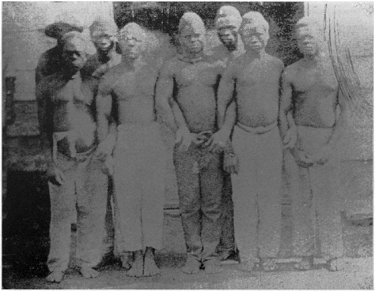History of Latin America
Week 3: Africans in Colonial Latin America
Lecture outline
Readings:
**"Becoming Legally White in Venezuela";
**Montejo, “A Cuban Slave's Testimony”
Current events topic due in class Thursday!
and the
study guide for next Tuesday's quiz

“African workers of the Canal de Vento,” a picture taken by French doctor Henri Dumont in the 1860s in Cuba. These men were probably captured on slave ships, then nominally freed by the Spanish and forced to labor on public works. Image reproduced in Rebecca J. Scott, Slave Emancipation in Cuba : The Transition to Free Labor, 1860-1899 (Princeton , NJ : Princeton University Press, 1985).
We'll talk in class about maroon communities and about the kinds of sources available for learning or guessing more about them, but Palmares is the only one with much on the Web.
A nice site on historical tensions between the Dominican Republic and Haiti;
And finally, on Haitian and Haitian-American history, with provocative caricatures of Toussaint Louverture and the mid-19c Haitian leader Soulouque.
For those of you planning to be engineers, in Mexico or elsewhere, listen here.
***********************************************************
A key aspect of Latin American slavery is that drawing on traditions of Iberian slavery, in many places Spanish and Portuguese America quickly gained a free black population equal or larger than its slave population:
| Country | Slaves | Free Blacks | Percent Free | |
|---|---|---|---|---|
| Spanish | ||||
Panama | 3,500 | 33,000 | 90% | |
| Cacao zone of Ven.: | 64,000 | 198,000 | 76% | |
| New Granada: | 80,000 | 420,000 | 84% | |
| Santo Domingo: | 15,000 | 80,000 | 84% | |
Portuguese
| ||||
| Minas Gerais, Brazil | 40.9% | 33.7% | ||
| Bahia, Brazil | 47% | 31.6% | ||
| Pernambuco, Brazil | 26.2% | 42% | ||
| Brazil overall | 34.5% | 31.4% | ||
| Non-Iberian | ||||
| Haiti (Saint Dominique)/ Martinique/Guadeloupe, combined: | 575,000 | 30,000 | 5% | |
| USA in 1790: | 660,000 | 32,000 | 4.6% | |
Think about what different ideas about "blackness" and "whiteness" might exist in a slave society that included large numbers of free black people engaged in a huge range of occupations--as opposed to one where being "black" generally meant being a slave.